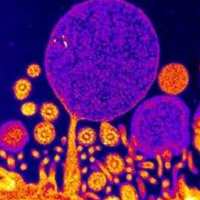 We are studying new materials and technologies that solve biological and medical problems at the nanoscale. Examples of our research include artificial bone, biosensors and detection, imaging of biological samples on the nanoscale, nanotoxicity and biocompatible polymers.
We are studying new materials and technologies that solve biological and medical problems at the nanoscale. Examples of our research include artificial bone, biosensors and detection, imaging of biological samples on the nanoscale, nanotoxicity and biocompatible polymers.
Our approach is both experimental and theoretical, where we are developing models which rationalise biological functions and interfaces.
| Name | Title |
|---|---|
| Tony Cass |
Professor of Chemical Biology, Deputy Director and Research Director (Bionanotechnology) in the Institute of Biomedical Engineering. His research group works on sensing and microanalytical devices with a particular focus on human and animal health. |
| Yuri Korchev |
Professor of Biophysics, Department of Medicine |
| Julian Jones |
Professor in Biomaterials, Department of Materials Research work on process development of foamed gel-derived bioactive glass (the first 3D porous scaffold made from bioactive glass) and inorganic/ organic hybrids. |
| Alex Porter |
Professor in Bioimaging & Analysis, Department of Materials Has extensive experience in using state-of-the-art analytical, aberration corrected high resolution and 3D electron microscopy techniques to image interfaces between radiation sensitive organic and inorganic materials. |
|
Lecturer in Materials, Department of Materials Research concerns novel nanomaterials synthesis and fabrication, and their applications in energy and life sciences. |
|
| Sunil Shaunak |
Professor of Infectious Diseases, Department of Medicine |
| Molly Stevens |
Professor of Biomedical Materials and Regenerative Medicine, Research Director (Biomedical Material Sciences) in the Institute of Biomedical Engineering Research is focused on both high quality fundamental science and translation for human health. Research in regenerative medicine within her group includes the directed differentiation of stem cells, the design of novel bioactive scaffolds and new approaches towards tissue regeneration. |
| Iain E. Dunlop |
Lecturer in Biomaterials, Department of Materials Current research focus on Mechanisms of cell-nanomaterial interactions; nanomaterials for tissue engineering and immunology. |
| Theoni Georgiou |
Lecturer in Materials, Department of Materials Research interests involve synthesis and characterisation of polymers and their evaluation in a variety of applications like drug delivery, gene delivery, photothermal therapy. |
| Joshua Edel |
Professor in Micro and Nanotechnology, Department of Chemistry Research covers nanobiotechnology with an emphasis on the development of micro and nanofluidic devices for analytical and bio-analytical applications and ultra-high sensitivity optical detection techniques. |
| Andrew Horsfield |
Reader in the Theory & Simulation of Materials, Department of Materials Current research interests cover the dynamics of electrons out of equilibrium, and the thermodynamics of complex interfaces. |
| Sophia Yaliraki |
Professor of Theoretical Chemistry, Department of Chemistry Research includes developing new mathematical and computational frameworks that can address the molecular basis (and loss) of biological function at different time and length scales. |
| Steve J Matthews |
Professor of Chemical and Structural Biology, Department of Life Sciences Research focuses on unravelling the structural mechanisms by which pathogenic species attack their eukaryotic hosts. |
|
Senior Lecturer in Inorganic Chemistry, Department of Chemistry Research is focused on nanomaterials with multiple surface units performing different functions. Many of these are based on molecular (d- and f-block) metal units for MRI contrast enhancement, PET imaging, optical imaging, targeting and therapy. These nanoscale systems are based on gold and iron oxide nanoparticles as well as nanorods and nanostars of gold. All materials are prepared and functionalised in our own laboratories. We also develop new attachment methodologies. |
|
| Dr Lorenzo Di Michele
|
Research Fellow (Royal Society URF), Department of Chemistry
|
| Dr Nazila Kamaly
|
Lecturer, Department of Chemistry Research is highly multidisciplinary and uses bioinspired approaches to synthesise targeted multi-functional polymeric nanomedicines capable of changing their surface or core properties in response to local or up-regulated disease markers for stimuli-responsive and spatiotemporally controlled biological drug delivery. These polymeric nanomedicines are synthesised using nanopolymerisation reactions in confined droplets. We also investigate nanomedicine bio-efficacy using biomimetic models with controlled environmental parameters for testing nanoparticle physicochemical properties. This facilitates a more dynamic biological mechanistic insight between nanoparticles and target cell populations.
|
Address
Nano @ Imperial
Royal School of Mines
Imperial College London
Exhibition Road
London SW7 2AZ
Email: nano@imperial.ac.uk
